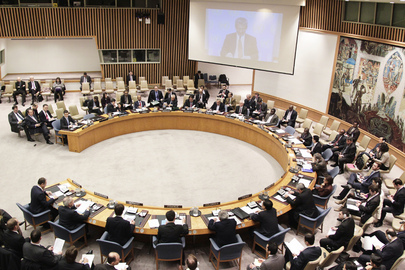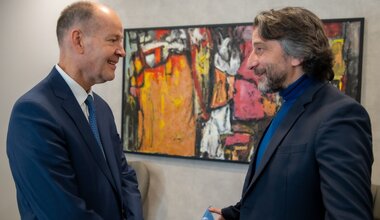8 February 2012
Mr. President, Excellencies,
The report before you details the situation in Kosovo and related UNMIK activities from 16 October 2011 to 15 January 2012.
While the situation on the ground has calmed down compared to the time of the Security Council’s last session on UNMIK, it remains fragile. In presenting this first UNMIK report of 2012, I would like to take the opportunity to look ahead to a year in which renewed attention from the Security Council is merited – even as other pressing matters demand your scrutiny and concern. I believe that such attention will be essential if we are not to miss real opportunities for the resolution of longstanding differences and the consolidation of long-term peace and stability in the region.
……………………………
First, let me touch upon the situation in the northern part of Kosovo, which is well documented in the report before you: the clashes in an ethnically-mixed neighbourhood in North Mitrovica on 9 November, and the clashes on 23 and 28 November between Serb demonstrators and KFOR soldiers, have marked a very tense start to this reporting period. However, as the dialogue between Belgrade and Pristina was resuming in Brussels following a three-month hiatus, all sides renewed their efforts to stabilise the situation on the ground and focused their attention to achieve results through good faith engagement.
On 29 November, Serbian President Boris Tadić publicly called for the dismantling of all Kosovo Serb roadblocks in the North. Although this message has continued to be disregarded by some municipal leaders in the North, notably those belonging to Serbian opposition parties, discussions on the ground, variously involving UNMIK, EULEX and KFOR have resulted in a relative stabilisation of the situation.
As a result of these coordinated efforts to calm tensions in the North, KFOR’s ability to conduct essential operations there has substantially improved compared to the previous reporting period. The northern Serbs, while continuing to protest against EULEX for the transport by helicopter of Kosovo officials to the northern crossing points, have nonetheless recently begun to allow EULEX greater freedom of movement, including as part of KFOR convoys along the major routes in the North.
Alongside these modest improvements, however, other significant political challenges continue to emerge. At present, local leaders in the North are proceeding with plans to conduct next week a “referendum” on the acceptance by the local Kosovo Serbs of the Kosovo institutions. This is despite clear opposition to this initiative from Belgrade, as well as from some of the Kosovo Serb leaders residing in the South. This is another case where close cooperation between all stakeholders on the ground will be crucial in ensuring that potential tensions are kept under control and common messages are conveyed.
UNMIK SRSG, Farid Zarif, recently conveyed to local leaders in the North that they must seek legitimacy through elections that are in conformity with applicable laws. Although UNMIK is no longer in a position to administer such elections in Kosovo, it will be ready to facilitate them along with international partners, so long as a fitting modality for this can be found and agreed upon. Assisting in the matter of ensuring legitimate municipal representation in the North must be a joint and immediate priority of the international community, in the earliest practicable timeframe.
……………
This reporting period also saw considerable progress in the EU-facilitated dialogue between Pristina and Belgrade, both through new agreements reached and through the implementation of previous agreements. The dialogue restarted in November under challenging circumstances, but positive results were achieved during sessions in November and early December, demonstrating that practical agreements, designed to alleviate daily problems, are achievable. In particular, the agreement on the integrated management of crossing points, while awaiting finalisation of detailed implementation modalities, represents an important breakthrough and an encouraging signal of goodwill from each party.
It is noteworthy that, during the periods when Pristina and Belgrade maintained an intensive engagement in this process, tensions on the ground decreased considerably, and the potential for stability increased. It is therefore crucial that the sides maintain their commitment to engage in a constructive dialogue, and that we continue to help ensure that peaceful conditions are maintained on the ground to avoid unnecessary interruptions. Your active assistance in encouraging both parties to move more resolutely toward viable solutions on the issues which divide them is therefore extremely important.
………………………
SRSG Zarif, in his briefing to this Council last November, called upon the parties to show “good will, pragmatism, boldness, courage and full statesman-like responsibility.” I would like to renew this call and note that, recently, there have been some tentative, yet encouraging signs of readiness by the political leadership both in Belgrade and in Pristina, to elevate the quality of their public discourse, and use a more conciliatory language. I hope that this represents the beginning of a trend that will grow during the year, in spite of the political obstacles faced by each side. Key international stakeholders can, and should play a decisive role in ensuring that these positive gestures are translated into concrete actions.
……………………………….

Mr. President, the attention of this Council is presently drawn to other urgent crises. However, I would be remiss should I not take the opportunity today to say that the state of affairs in Kosovo still carries a number of risks, which could become more entrenched with each passing year. Optimistic assumptions that a durable solution will simply evolve– even without a clear vision from a more united engagement of the international community – are belied by dynamics on the ground. This is particularly true, but not limited to the developments we have witnessed in Northern Kosovo during the last quarter of 2011.
We are certain that these dynamics can be harnessed, but also equally certain that this is possible only if renewed energy and focus are applied by all those with the means and interest to do so. As the European Union steps forward in a leadership role, achieving political progress equally demands better cohesion of the efforts of all engaged international actors.
Therefore, today, I would like to urge all stakeholders to take stock of their current engagements in Kosovo. The financial cost of maintaining the international presences in Kosovo is high. It includes, in broad terms, some 47 million dollars annually for UNMIK; around 140 million Euros for EULEX; 23 million Euros for the OSCE; as well as combined annual operational costs to NATO and to KFOR troop contributing countries that bring the total close to half a billion dollars.
We should each be asking whether these considerable expenditures are being applied as rationally and efficiently as they could be. And, even more importantly, whether they are contributing in a coordinated fashion toward a solution under which such expenditures can safely be reduced in the foreseeable future. In the course of 2012, it is critical that we do not miss the opportunity of jointly addressing fundamental issues of efficiency, as well as of common political purpose and vision. This New Year could be the time to re-examine our assumptions, and to seek fresh approaches.
Finally, I would like to thank the members of this Council for their support to UNMIK and for its efforts to tackle the problems outlined in the present report. We hope that you will maintain that support, especially by helping to promote the greater international unity of purpose and efficiency of effort needed for progress to be made during 2012.
Thank you, Mr. President.
Photos: UN Photo

 UN
UN United Nations Peacekeeping
United Nations Peacekeeping





